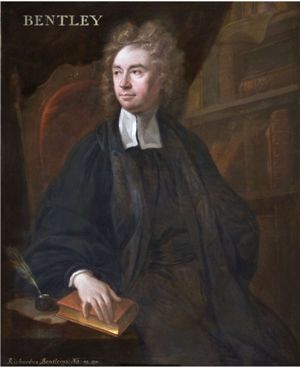Richard Bentley
1662-1742. Master of Trinity; Regius Professor of Divinity
A classical scholar,  critic, philologist and theologian, Bentley was the first Englishman to be ranked with the great heroes of classical learning; he was known for his literary and textual criticism. Called the "founder of historical philology", Bentley is credited with the creation of the English school of Hellenism. He inspired generations of subsequent scholars. Regarded as the foremost scholar and textual critic of his day, Bentley was regarded, together with Newton, as one of the intellectual founders of Trinity, but as Master he ruled like an irresponsible despot.
critic, philologist and theologian, Bentley was the first Englishman to be ranked with the great heroes of classical learning; he was known for his literary and textual criticism. Called the "founder of historical philology", Bentley is credited with the creation of the English school of Hellenism. He inspired generations of subsequent scholars. Regarded as the foremost scholar and textual critic of his day, Bentley was regarded, together with Newton, as one of the intellectual founders of Trinity, but as Master he ruled like an irresponsible despot.
He became Master in 1700 and reformed the College administration. He initiated a programme of renovations to the buildings, in particular the Chapel and the Master's Lodge, with no regard to the opinions of the Fellowship on the matter.
After ten years of stubborn but ineffectual resistance, the Fellows appealed with their complaints to the Visitor, the Bishop of Ely (John Moore). Bentley's reply (The Present State of Trinity College, etc., 1710) is in his most crushing style. The Fellows amended their petition and added a charge of Bentley's having committed fifty-four breaches of the statutes. Bentley appealed directly to the Crown, and backed his application with a dedication of his Horace to the Lord Treasurer (Harley).
The Crown lawyers decided against him; the case was heard (1714) and a sentence of expulsion from the Mastership was drawn up. Before it was executed, the Bishop of Ely died and the process lapsed. The feud continued in various forms at lower levels. In 1718 Cambridge rescinded Bentley's degrees, as punishment for failing to appear in the Vice-Chancellor's court in a civil suit. It was not until 1724 that he had them restored under the law.
In 1733 the Fellows again brought Bentley to trial before the Bishop of Ely (then Thomas Greene), and he was sentenced to deprivation. The College statutes required the sentence to be exercised by the Vice-Master Richard Walker, who was a friend of Bentley and refused to act. Although the feud continued until 1738 or 1740 (about thirty years in all), Bentley remained in his post.
He died while still under sentence of deprivation, and was buried in an obscure corner of the Chapel, near the altar, where his tombstone makes no mention of his Mastership.
| Tombstone inscription | Translation |
|
H.S.E. RICHARDVS BENTLEY S.T.P.R. OBIIT XIV IVL. MDCCXLII |
Here lies Richard Bentley, Regius Professor of Divinity. He died on 14th July 1742 at the age of eighty. |
Richard Bentley
|
|
|
|
PREVIOUS INTERMENT |
|
NEXT INTERMENT Daniel Brattell |
| Sculpture Gallery |
Brass Gallery | Statue Gallery | Interments &Tombstones Gallery | War Memorial Gallery |

